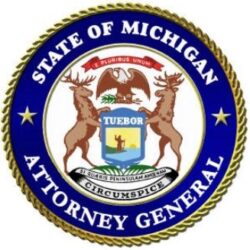
Media Contact:
Ryan Jarvi
(o) 517-335-7666 (c) 517-599-2746
FOR IMMEDIATE RELEASE:
Thursday, April 2, 2020
AG Nessel Joins Call for Feds to Prioritize COVID-Related Rulemaking and Freeze Non-Urgent Rules
States, Businesses and Individuals Focused on Public Health Emergency Have Little Time to Respond to Non-urgent Federal Rules, Which May Have Unintended Effects Due to COVID-19
LANSING ― Michigan Attorney Dana Nessel and 20 other state attorneys general this week urged the federal government to prioritize guidance and rulemaking related to the outbreak of the coronavirus disease 2019 (COVID-19) and to set aside all non-essential rulemaking not related to the current crisis.
In a letter sent Tuesday to the acting director of the federal Office of Management and Budget (OMB), the attorneys general note that such measures will allow the federal government, as well as state and local authorities, to focus resources on addressing the COVID-19 pandemic and avoid requiring action that would redirect resources away from the crisis during a time when communicating with residents, businesses, and state and local governments may be limited.
“This action is essential to managing this public health crisis and the unfathomable impact it has had at every level across this nation,” said Nessel. “COVID-19 continues to wreak havoc over our communities, and the primary focus of all federal, state and local agencies must be to do everything possible to halt its destruction.”
Beyond calling on the federal government to dedicate itself to rules related to COVID-19, the attorneys general call for a general freeze – similar to what was adopted on the president’s first day in office – on all new and pending rules other than those that address emergency situations or other urgent circumstances relating to health, safety, financial or national security matters, or that are required by statutory or judicial deadlines.
The coalition also asks the administration to consider reopening particular already-
The letter goes on to observe that federal agencies already have taken some steps to prioritize resources to focus on COVID-19, and that some federal agencies have already extended rulemaking comment periods in response to the pandemic.
“My colleagues and I recognize that very important rulemaking could be delayed based on what we request in our letter, but we also recognize the enormity of the COVID-19 crisis and to stop its destruction, we must remain laser-focused on our response,” Nessel added.
Among the rule proposals that could be postponed if the federal government were to prioritize rulemaking related to COVID-19 are proposals that would eliminate or roll back protections against predatory lending, housing discrimination, sexual harassment and violence in education, and discrimination against LGBTQ+ individuals in federally funded programs. Other proposals that could be delayed—including cutbacks in the Supplemental Nutrition Assistance Program or food stamps—would affect far more Americans today than when they were originally proposed because of the recent economic downturn.
The letter concludes by noting that the requested freeze is important to ensure the federal government does not take rulemaking steps that would call for action by state or local governments, businesses, other organizations and the public at a time when their “ability to meet and communicate with each other has been limited” by the COVID-19 pandemic.
Nessel joins the attorneys general of Colorado, Connecticut, Delaware, District of Columbia, Hawaii, Iowa, Maine, Maryland, Massachusetts, Minnesota, Nevada, New Jersey, New Mexico, New York, North Carolina, Oregon, Pennsylvania, Rhode Island, Vermont and Virginia in submitting this letter.

